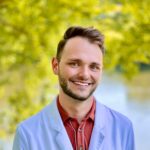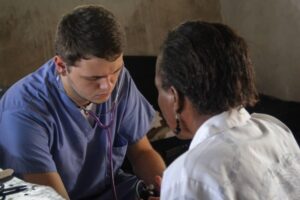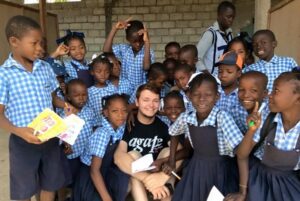Volume 38 Number 2 | April 2024
Jesse L. Day, MHA, MLS(ASCP)CM, ASCLS Ascending Professionals Forum Chair

On Tuesday, January 12, 2010, a 7.0 magnitude earthquake unleashed its rage on the small island nation of Haiti. The damage was catastrophic. The death toll was unlike anything the island nation had seen before. The situation evolved quickly and became desperately bleak. Like in many natural disasters, water contamination was rampant, leading to a Cholera crisis. International aid organizations from all over the world saw Haiti’s plight and answered her cry for help. Amongst these response teams was a church volunteer group from a little town in east Tennessee with a curious boy, eager to help.
I stepped off the plane in Port-au-Prince, Haiti, and one of the volunteers asked, “Are you scared yet?” I simply responded, “No, I don’t know how or why, but I was born for this.” And for the next five years, alongside interprofessional medical teams, I traveled to Haiti working as a pharmacy technician, triage technician, and various other roles that the work demanded. I often found myself sneaking into the field laboratory to get a peek at the blood smears and hear about the different instruments. I remember one day a friend and longtime medical laboratory scientist looked at me during clinic and said, “You’re going to be one of us! I just know it!”
Not long after, it seemed the ladies took me under their wing and began teaching me, allowing me to spend hours with them looking at slides and reviewing patient cases. Malaria, specifically Plasmodium falciparum, is an enormous problem, as about 80 percent of Haitians face regular exposure. In this laboratory, discovering the parasite and notifying the physician was the mission. These medical laboratory professionals saved lives every single day. It was here, on hard tile floors surrounded by cinder-block walls baking under the tropical heat of the Haitian sun, that I found my love for the lab. Seeing first-hand that laboratory medicine was able to galvanize the authority of field medicine by endowing it with the ability to discover and treat these hidden diseases stirred my young soul and sparked my mind. I finally understood what I meant when I had said, “I was born for this.”
As my teenage years came to an end and my travels slowed, it was clear to me what career I would pursue. I couldn’t shake it—the interest in being able to read slides, understand clinical data, and play a part in healing. Because of what started as cool images and small talk in a field clinic on the coasts of Jacmel, Haiti, I graduated from Virginia Commonwealth University in 2020 with my BSc in Clinical Laboratory Sciences and on June 15, 2020, I was certified as an MLS(ASCP)CM.
You see, these ladies in the field laboratory taking a few moments to explain their jobs and show me something interesting helped this lost boy find a world I didn’t even know existed. The clinical laboratory’s work is critical and foundational to medicine, so it’s important we highlight our expertise in the field. Taking credit where credit is due also spotlights the profession by teaching others. How often are we asked, “Oh, what do you do for work?” Don’t brush off the question or just say something like, “I’m a med tech!” Fill in the blanks when you get the chance.
Life has changed and I don’t find myself in Haiti nearly as often, though I’ve carried on my heart of service and my love for all things laboratory. When I rise to walk up on stage at a speaking engagement or conference, I think back to the coasts of Jacmel, student labs of my alma mater, and the various hospital laboratories I’ve served in, and I’m reminded that medical laboratory professionals belong at any table where decisions are being made. We make a difference when we show up, even in the smallest ways.
Jesse L. Day s a Histocompatibility and Immunogenetics Scientist at Vanderbilt University Medical Center in Nashville, Tennessee.
Author Jesse Day volunteered in Haiti after the 2010 earthquake for a number of trips over five years. Through this work he discovered his passion for the medical laboratory profession.
“As my teenage years came to an end and my travels slowed, it was clear to me what career I would pursue. I couldn’t shake it—the interest in being able to read slides, understand clinical data, and play a part in healing.”

